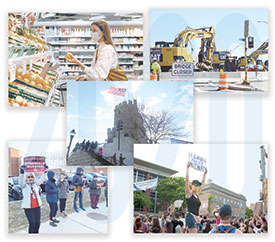
By The Times Staff
It was a year that will go down as one of the most challenging, emotion-charged and controversial periods in modern history. From a deadly worldwide pandemic and its devastating effects on human lives, lifestyles, and economic stability, to an incredibly divisive national election sullied by allegations of fraud and corruption on all sides.
Locally, residents of Somerville and its immediate environs were hardly shielded from these issues, and were forced to deal with them as thoughtfully and resolutely as any other community.
Here are some of the stories that were covered in The Times throughout the year 2020:
The year began much like any other. The City of Somerville held its annual tradition of raising the Grand Union flag at Prospect Hill Tower for the twentieth time on January 1, and the spirit of the New Year blew a fresh breeze of optimism throughout the city.
The Somerville Teachers Association (STA) and community members turned up, wearing red, at a January Somerville School Committee Meeting, advocating for better wages for the city’s many paraprofessionals. A tentative agreement on a 3-year contract was ultimately reached in June.
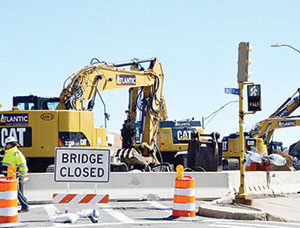 The GLX Project continued wreaking commute time havoc with its road and bridge closures throughout the first half of the year, with gradual improvement and a relative return to normalcy taking place later in the year.
The GLX Project continued wreaking commute time havoc with its road and bridge closures throughout the first half of the year, with gradual improvement and a relative return to normalcy taking place later in the year.
In February, the city’s ban on plastic straws and stirrers went into effect.
Later in the month, Somerville officials and local organizations responded to the Trump administration’s decision to deploy 100 border patrol agents to ten major sanctuary cities, including Somerville. Mayor Curtatone called the new plan, “a despicable election stunt that puts hard working people seeking to escape violence and poverty in the crosshairs.”
In March, the City Council welcomed new Councilor At-Large Kristen Strezo as she stepped in for former Councilor At-Large Stephanie Hirsch, who had resigned for personal reasons.
Somerville residents learned of the extent of the COVID-19 pandemic that was developing worldwide. City buildings and schools were closed and social distancing was encouraged. The governor issued temporary stay at home advisories as entertainment venues in the city closed their doors for the remainder of the year. The use of masks and the importance of hand washing was also stressed.
Educators and parents coped with school closures by encouraging home schooling via virtual classrooms.
The city imposed a moratorium on evictions as many residents faced unemployment as a result of the pandemic.
The federal CARES Act provided funds to individuals earning less than $75,000. Most Americans received $1,200 and businesses were given the opportunity to borrow funds to sustain their operations.
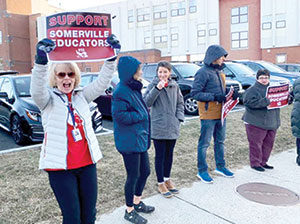 Somerville’s Assembly Row played host to a mechanical system capable of sterilizing as many as 80,000 respirator masks per day, a tremendous boon to medical facilities engaged in the fight against the COVID-19 epidemic.
Somerville’s Assembly Row played host to a mechanical system capable of sterilizing as many as 80,000 respirator masks per day, a tremendous boon to medical facilities engaged in the fight against the COVID-19 epidemic.
With the coronavirus closing businesses and putting people out of work, and more individuals losing their main source of income, affecting their financial stability and forcing them to find alternate means, Somerville’s Project SOUP (Share Our United Pantry) provided a free food pantry for residents in need.
Tufts University made its residence halls available to house medical personnel, first responders, and patients, including those recovering from COVID-19, in an effort to help contain the spread of the virus.
Mayor Curtatone and the Somerville Board of Health issued an order to cease all non-emergency construction in Somerville by March 27. Exceptions were allowed only for efforts to make sites safe and for health- and safety-related activities.
In April, Mayor Curtatone announced the launch of a $1 million Somerville Small Business COVID-19 Relief Fund to provide financial support of up to $10,000 to Somerville small businesses impacted by the COVID-19 pandemic.
Also, in April, residents of the Mt. Pleasant senior apartment building in Somerville were placed under a mandatory minimum 14-day quarantine after eight cases of COVID-19 were confirmed by the Massachusetts Department of Public Health at the residence.
By the end of the month, the Somerville Board of Health announced that Somerville’s facial covering advisory would become mandatory. The new order required anyone over the age of two to wear a clean face mask or face covering when in any indoor or outdoor space that is open to the public.
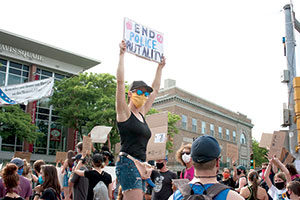 In May, the annual Somerville Open Studios (SOS) event took place, but not in its traditional form. The citywide art event featured virtual galleries by 336 artists. During the event, six artists held Zoom livestream tours of their studios for virtual audiences.
In May, the annual Somerville Open Studios (SOS) event took place, but not in its traditional form. The citywide art event featured virtual galleries by 336 artists. During the event, six artists held Zoom livestream tours of their studios for virtual audiences.
The annual PorchFest was transformed into CouchFest, the same basic event for local musicians to perform at home for audiences, but this time from a safe distance, broadcasting online.
In an effort to provide more walking and biking routes that allow for more social distance, the city’s Mobility Team developed a shared streets plan based on international best practices and customized to Somerville’s public health needs. For Shared Streets, low-volume or residential side-streets are opened up to pedestrians, cyclists, and other users while still allowing vehicles but limiting those vehicles to abutters, first responders, and delivery.
Strict guidelines due to the COVID-19 pandemic forced new protocols to be put in place for open-air farmers markets nationwide, and in Somerville the market organizers were as cautious as ever to keep residents safe. Both the Union Square and Davis Square markets had to adapt accordingly before reopening.
Somerville High School contended with the COVID-19 situation by holding a series of “drive-up” graduation events at the Dilboy Stadium parking lot over the course of two days in June. Each graduate individually walked across the stage, received their diploma, and had their photo taken.
Also, in June, $1.5 million in rental assistance was provided by the city for Somerville residents experiencing financial hardship as a result of the COVID-19 pandemic. The funding, which was provided by the federal CARES Act, was distributed to local nonprofits to support rental assistance for low- and moderate-income households.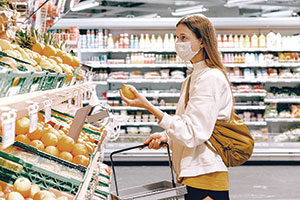
Under strict guidelines, barbershops and hair salons were finally allowed to reopen in June.
Protestors came together in Davis Square in June to peacefully express their feelings about the deaths of African Americans such as George Floyd and others. No instances of violence or vandalism were reported.
In addition, a candlelight vigil in honor of George Floyd, Breonna Taylor, Ahmaud Arbery and others killed by police brutality and racist violence took place at the East Somerville Public Library.
At the end of July, The Jeanne Jugan Residence Advisory Board for the Little Sisters of the Poor sent the nuns off to their Provincial Residence in Queens, NY. A caravan of police, firefighters and a color guard kicked off the parade with over 200 vehicles of families, friends and grateful residents in recognition of their dedication to the community for the past 150 years of Catholic ministry in the greater Boston area for taking care of the elderly poor.
The Winter Hill Urban Renewal Plan, which includes the vacant 31,000 sq. ft. Star Market, was approved by the Somerville Redevelopment Authority (SRA) in September.
Also, in September, A local organization created a Black Lives Matter mural in the middle of Magoun Square.
The Clarendon Hill Redevelopment Project was approved by the Somerville Zoning Board of Appeals in October, clearing the way for Somerville’s most ambitious affordable housing project in recent years.
Also, in October, Michael McGrath, a Somerville police officer, was placed on administrative leave and his pay revoked after an investigation into an October 1, 2019 arrest reportedly turned up evidence that he had used pepper spray on a suspect who had been placed under arrest and was already in handcuffs.
Former Acting Chief of Police Charles Femino agreed to serve as the Acting Chief of Police effective December 12 until a permanent replacement is found for departing Chief David Fallon, who announced his pending retirement in March.
Throughout the latter part of the year, various shutdowns and temporary closures seemed to be a daily occurrence. Several restaurants and entertainment venues either went dark for the winter or closed altogether.
Various Phases and Steps towards reopening wavered back and forth in response to increases and decreases of reported COVID-19 infections were reported.
Public events such as the SomerStreets, Fluff Festival, and HONK! were either cancelled or went virtual for the year.
Meanwhile, Zoom became a household word as virtual meetings and town halls picked up where in-person contact was deemed to be too risky.
Yet through it all, people came together to help one another get through the most trying time they will likely ever know. Whether making and donating face coverings, providing food and other essentials to those in need, or any number of other acts of selfless generosity, the people of this city rose to the occasion in grand fashion.
May 2021 bring us to a safer, more peaceful state of being.












Reader Comments